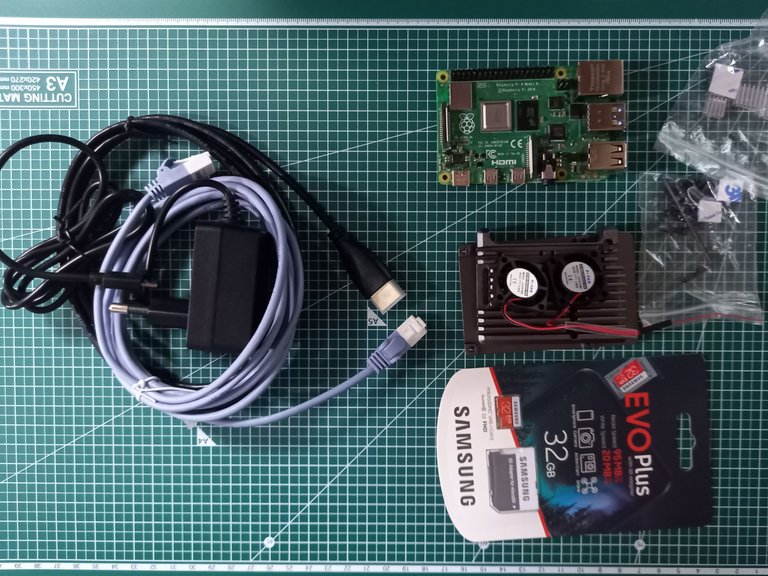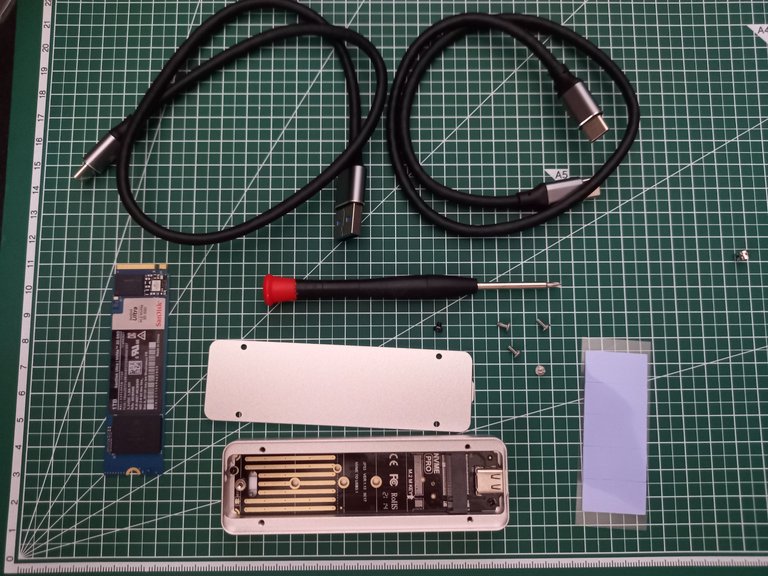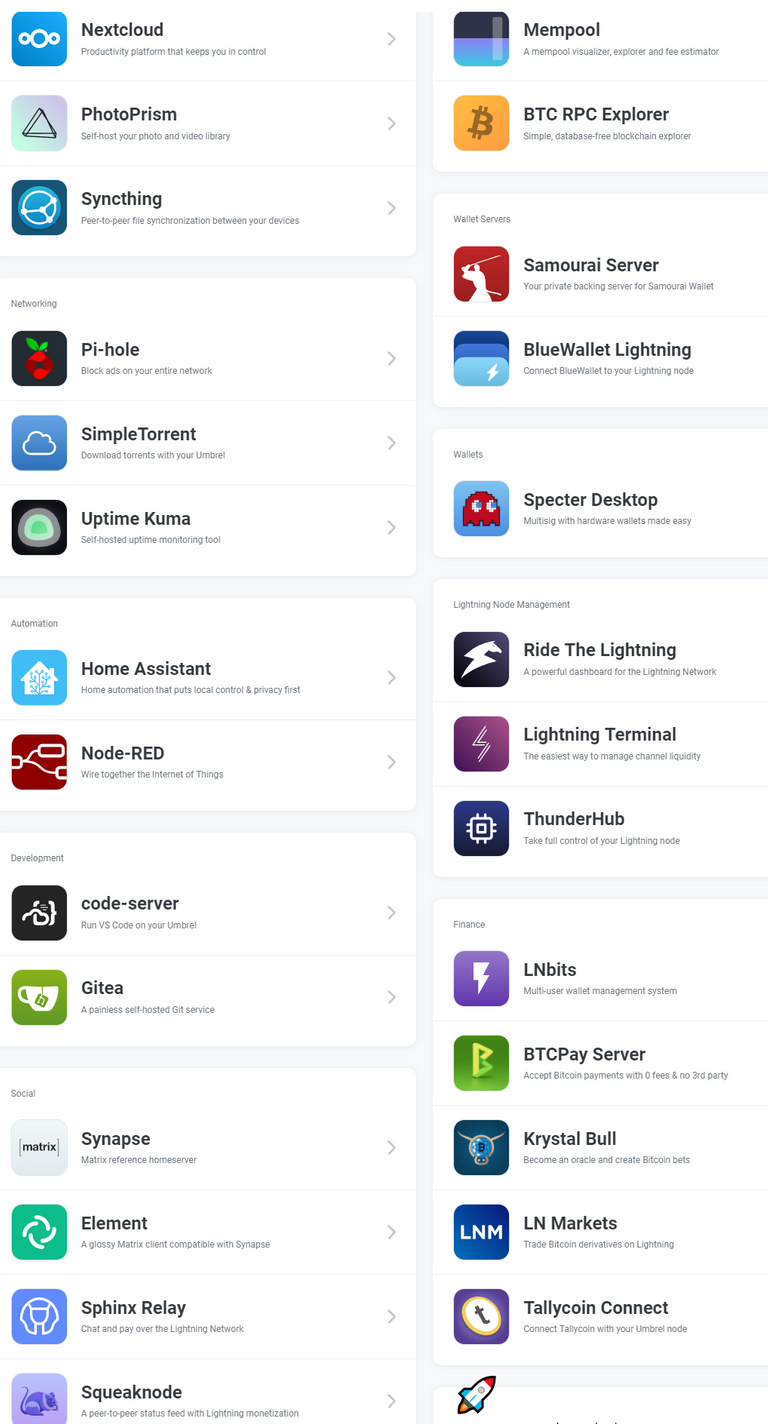As a bitcoin skeptic, time to come clean. I've got a confession to make.
I'm secretly running a secret bitcoin node. Well, I guess it's not a secret anymore.
Those of you who know me may know I've liked Bitcoin since well before I've been on Hive. I'm just skeptical about some aspects of Bitcoin and other digital assets. You should be, too.
But this isn't about me or my relationship with cryptocurrency. This is about my new(ish) BTC node.

My node is basically a raspberry pi 4 (8gb model) with a heatsink case, 2 small fans, a 1TB SSD (NVMe) & case, and a bunch of wires. I selected the hardware and assembled it myself, then stuck it on the middle row of the TV stand where all the electronics I need but don't really need to see or touch go.
The Hardware

Here are the computer components necessary for the RaspberryPi. It includes a Raspberry Pi, power supply, ethernet cable, micro-HDMI to HDMI cable, Micro SD card and a cooling unit.
I decided to go with the 8GB Raspberry Pi 4 because using a different computer requires more money, more technical skill, and/or compromises. The Raspberry Pi is a well-known brand of tiny computers, with a ton of support and the the Pi4 (8GB) model is currently the top of the line. I went with the EVO Plus 32GB micro SD for similar reasons. You don't want cheap stuff when it's always going to be left on (get a good power supply too).
The heat sinks and the fans are really the only things you need to think about. The shop I bought it off of in Korea said these are good and I've seen similar on Amazon with great reviews. Basically, if the fans stop working, the massive aluminum heat sink should be able to stop the thing from melting too quickly.
Another separate hardware component I needed was the main storage drive. I went with an NVMe instead of the standard SSD just for the hell of it. I selected Sandisk because Samsung was too expensive. It's a 1TB which is funny, because my desktop only has a 500GB NVMe, so yeah, it's bigger and better.
Selecting the case was a bit of a pain because there are different types of M2 drives and you need to know what you are buying or it won't fit. Also, you should consider heat dissipation. Fortunately, it came with two connector chords because the raspberry pi 4 only has 1 USB-C port and that's for the PSU.
Assembly

Are you kidding me? The thing came with instructions, screw and tools, and it's basically plug-and-play. Also, there are tons of tutorials online for assembling off the shelve electronics. That said, you do need to make sure the things stay cool, so use the heatsink adhesives properly. There are a few places you should definitely connect to the heatsinks. Anyway, the whole process took like 30 minutes and I was enjoying my DIY project.
Software Setup
I went with Umbrel. It's easy as hell to use and there is a tutorial. Basically, if you can figure out Hive and whatever you use to buy and sell Hive, you can probably figure this out.
Essentially, you need to take that MicroSD card, plug it into a computer, load a file onto it (you may need to download something to do this), then put the MicroSD card into the Raspberry Pi and connect it. Assuming your computer is on the same network, you will be asked to set up an account and boom, Bitcoin Core starts downloading (a lot). You wait.
So why Umbrel?
Umbrel is really simple. I was thinking of doing Raspiblitz, but it's less convenient. The risks of Umbrel (it's not fully open-sourced ) are a non-issue for 99% of people and it's a great way to start running a node. I'll probably switch to Raspiblitz later when they release the planned GUI update. Fortunately, if I do that, I'll just have to flash the MicroSD card with that software, but I don't need to download BTC core again (It's currently like 529.1GB and takes a couple of days).
Why would a Skeptic Run a BTC Node?

If you don't know why you should run a BTC node, read this. Basically running a node makes you less reliant on others running nodes and helps the overall security of the network. Also, if you use TOR (it's the only option on Umbrel now), it's really private. Basically, no one knows what transactions you are analyzing.
Also, you can host and open lightning network channels and have full control over a whole bunch of other bitcoin and layer 2 apps. For the record, I only use the BTC RPC Node and Mempool. I set up my node last July and still haven't bothered trying lightning, connecting it to my actual BTC wallet or using the other stuff. I'm not sure I want to mix other random apps (ex. photoserver) and I'm not really a privacy freak.
Impressions
Free yourself and run a node, totally worth it.
Actually, I was never a huge believer in "not your coins not your crypto". Avoiding scams aside, the government and perhaps violent criminals will screw with you one way or another
I don't think I'm being noble by "securing BTC", that was maybe a thing back around 2012 before GPU mining was the norm and $BTC was worth less than $HIVE is now. There are probably hundreds of thousands of Bitcoin nodes (most are well-hidden on TOR) and the hashrate is 190EH/s (I don't know what that means, but it's a lot).
I'm not even a bitcoin maximalist, far from it. But I do wonder about the people who hate it. Sure mining it with treadmills powered by endangered animals or slaves is wrong, and maybe even bad for the Earth, but meh, my Pi uses less power than a cell phone. I've got it connected to a massive UPS with a lead-acid battery instead of a couple AA's (we don't really lose power where I live, it's also helping other things I don't want suddenly turning off). Anyway, I don't buy the economic arguments fully in support of POS, DPOS or POW.
I run a node because I wanted to get into Raspberry Pis and connect with the network on a deeper level (that means research for people who don't speak hippie), I'm thinking of getting more Pis. I kinda want to do a media server - yup keep that shit separate. I am thinking of making a gaming pi, it will be flashy and have a cool case, it's a cheap and easy mid-life crisis project and I need to relive my youth even if I get bored of it after a week. Finally, I'm thinking of doing an Ethereum node of sorts. This is more complicated and it won't be a full node, also I would definitely want to use it more than my BTC node.
Let's see what's next.
